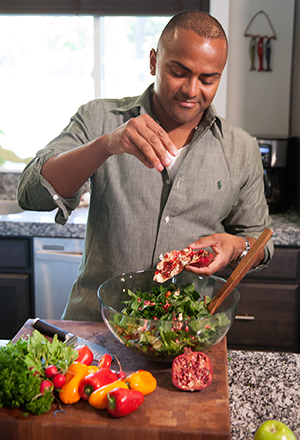Colorectal Cancer: Prevention
All people are at some risk of colorectal cancer. But some people have a higher risk than others. What can you do to help protect yourself against colorectal cancer? There's no sure way to prevent it. But you can make changes in your life that can help you control many of the risk factors. Here are some choices you can make that may help.
Lead a healthy lifestyle
 |
| Making healthy diet choices can help lower your risk for colorectal cancer. |
A healthy lifestyle may help to lower your risk for colorectal cancer. This includes:
-
Being physically active. Get at least 150 minutes of moderate-intensity physical activity each week. This can reduce your risk for colorectal cancer. Even fast walking and climbing stairs can help lower your risk. At least 75 minutes of intense physical activity each week also gives you protection. This includes running and aerobics. This is true even if you start exercising later in life.
-
Eating lots of fruits, vegetables, and whole grains. A diet that’s high in these foods can help lower your colorectal cancer risk. Experts don’t know if some vegetables or fruits might be better than others in lowering risk. So it's best to eat a variety of them.
-
Limiting red and processed meats. Limit foods, such as beef, pork, sausage, hot dogs, deli meats, and bacon in your diet. Instead, eat other protein sources, such as fish, poultry, or legumes.
-
Staying at a healthy weight. Being overweight or obese is linked to an increased risk of colorectal cancer and some other cancers. Ask your healthcare provider for help losing weight.
-
Not smoking. Smoking can raise the risk of colorectal cancer. Ask your healthcare provider for help quitting if needed.
-
Not drinking alcohol. Drinking alcohol can put you at higher risk for colorectal cancer. It's best not to drink alcohol. Men who do drink alcohol should limit themselves to 2 drinks or fewer per day. Women who drink should have no more than 1 drink per day. One drink is equal to 12 ounces of beer, 5 ounces of wine, or 1½ ounces of hard liquor. Ask your healthcare provider for help cutting back if needed.
-
Getting enough calcium in your diet. Some studies have found that higher calcium intake may lower the risk of colorectal cancer. But some research has found that more calcium may raise the risk of prostate cancer in men. Talk with your healthcare provider before you take calcium supplements.
Consider taking aspirin or NSAIDs if you have heart disease or chronic pain
Aspirin may lower your risk for colorectal cancer. So can other over-the-counter pain and fever medicines called NSAIDs (nonsteroidal anti-inflammatory drugs). These include ibuprofen and naproxen. But these medicines may cause serious side effects. These include stomach ulcers and an increased risk of bleeding. So healthcare providers don’t advise taking them for colorectal cancer protection alone. If you do have to take these medicines for heart disease or chronic pain, a lower risk of colorectal cancer may be an added benefit. Talk with your healthcare provider before taking these medicines.
Get screened for colorectal polyps and cancer
Screening tests can prevent colorectal cancer and save lives. They let the healthcare provider find and remove colon or rectal polyps before they can turn into cancer. Even if cancer does develop, screening often helps find it when it's small and treatment is most likely to work. Screening is vital in people who are at higher risk. Talk to your healthcare provider about your risk for colorectal cancer. Ask at what age you should start screening. Ask which screening tests might be right for you.
Online Medical Reviewer:
Jessica Gotwals RN BSN MPH
Online Medical Reviewer:
Sabrina Felson MD
Online Medical Reviewer:
Todd Gersten MD
Date Last Reviewed:
5/1/2023
© 2024 The StayWell Company, LLC. All rights reserved. This information is not intended as a substitute for professional medical care. Always follow your healthcare provider's instructions.